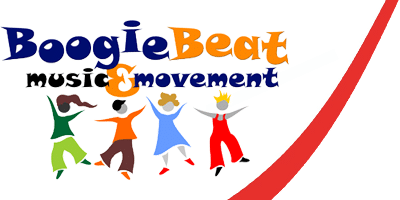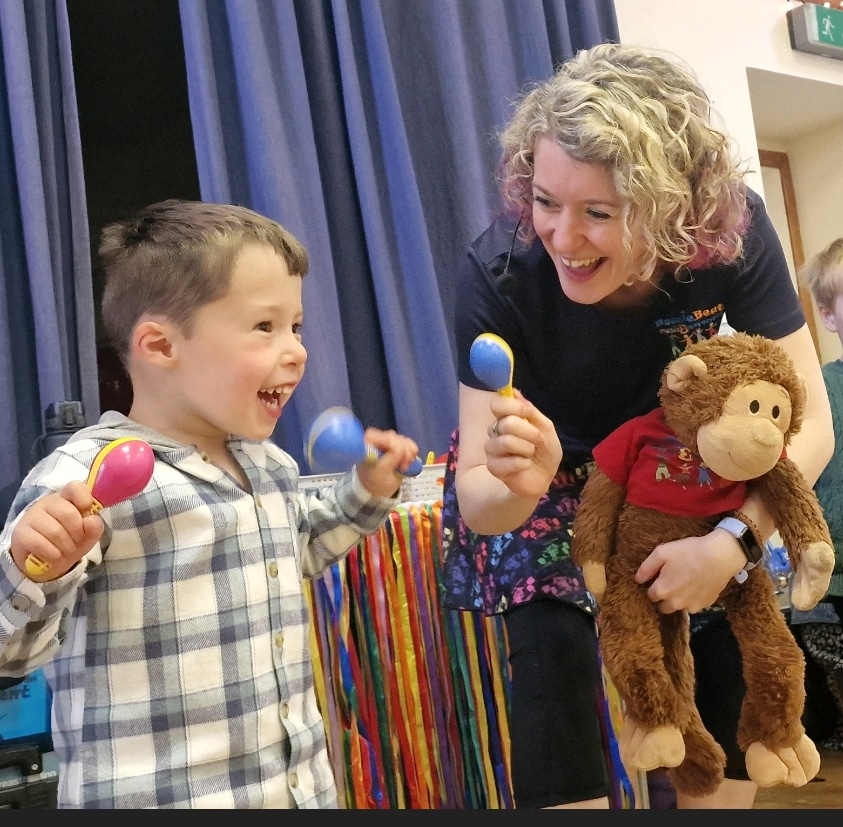Music is often called a universal language, but for babies and young children, it’s much more than that—it’s a powerful tool for development. From the gentle lullabies that soothe newborns to the playful songs that toddlers can’t stop dancing to, music plays a vital role in nurturing a child’s emotional, cognitive, and physical growth. But why is music so important for young children and babies and why is a Boogie Beat Music and Movement class a great way to introduce your child to music?
Boosts Brain Development
Research shows that exposing babies and young children to music can significantly enhance brain development. Listening to music stimulates both hemispheres of the brain, improving neural connections related to memory, spatial reasoning, and language skills. The repetitive patterns in songs help young minds recognise sequences and structures, building the foundation for mathematical and problem-solving abilities.
Studies have also found that children who engage with music early on often have better literacy and numeracy skills. In our Boogie Beat classes when children are singing songs this is playing a crucial role for them to understand language and reading.
Enhances Language Skills
Music and language go hand-in-hand. When children listen to songs, they are exposed to new vocabulary, different sounds, and various speech patterns. Even simple nursery rhymes help babies develop their auditory discrimination, allowing them to distinguish between different sounds and tones—skills they will need when learning to speak. See our blog on nursery rhyme importance here
Supports Emotional Development
Music has a profound effect on emotions, and babies are incredibly responsive to its soothing and uplifting qualities. From a very young age, children can sense the mood of a piece of music. A soft lullaby can help calm an anxious baby, while an upbeat tune can lift their spirits and make them giggle.
At Boogie Beat all our music is composed in house and so we make sure there is a large variety for little ones to listen to, from our beautiful calm music to our fun seaside hornpipe and our upbeat disco music! It is so rewarding seeing little ones join along with clapping, moving and dancing to the songs.
Fosters Bonding and Social Skills
Music is often a social activity, and it’s a great way for parents, caregivers, and children to bond. Singing lullabies, playing musical games, or simply sharing a favourite song creates a sense of closeness and emotional connection. Babies are particularly attuned to the voice of their caregivers, so singing to them—even if you don’t consider yourself a great singer—can strengthen that bond.
For older children, group musical activities such as sing-alongs or music classes teach important social skills. Children learn to take turns, listen to others, and collaborate in group settings. Music becomes a shared experience, helping children build relationships and navigate social interactions with their peers. Our Boogie Beat classes provide all this development for your little ones.
Encourages Physical Development
Music naturally invites movement, and for young children, this is essential for physical development. Babies love to sway, bounce, or clap along to the rhythm, while toddlers love to dance, hop and twirl to their favourite Boogie Beat tunes. These movements help develop gross motor skills (like balancing, jumping, and coordination) and fine motor skills (like clapping, finger motions, and holding small instruments).
Musical activities that involve movement in our classes, such as action songs like “Head, Shoulders, Knees, and Toes” or using simple instruments like maracas, tambourines, bells, also improves hand-eye coordination and spatial awareness.
Strengthens Memory and Attention Span
Music, especially songs with repeating verses and melodies, helps children develop strong memory skills. Many of us remember nursery rhymes and children’s songs from our early years—this is because songs help imprint information in the brain through repetition and melody.
As children engage with music, they also learn to focus on the rhythm, lyrics, or specific sounds, which strengthens their attention span. Learning to listen attentively to music sets the stage for better listening and concentration skills in other areas of life, such as when reading or following instructions.
Nurtures Creativity and Imagination
Music opens the door to creativity and imaginative play. As children experiment with sounds, rhythms, and movements, they begin to create their own interpretations of songs. Whether they’re banging on pots and pans, inventing lyrics to a tune, or dancing to their own beat, they’re tapping into their innate creativity. Boogie Beat Music and Movement is all about letting your child’s imagination come alive and our sessions really support this development for your little ones and we love hearing how they sing along at home to our songs and create their own ‘toy box’ time.
Conclusion: The Power of Music in Early Childhood
Music is much more than just entertainment for babies and young children. It’s a critical component of their cognitive, physical, and emotional development. Whether through singing lullabies, moving to the rhythm, or exploring sounds, music offers a multitude of opportunities for learning, bonding, and growth. By attending a group like Boogie Beat Music and Movement with your little one you are giving you child the chance to experience the joy of creativity and the countless developmental benefits that come with it. Find out where your nearest class is here.


